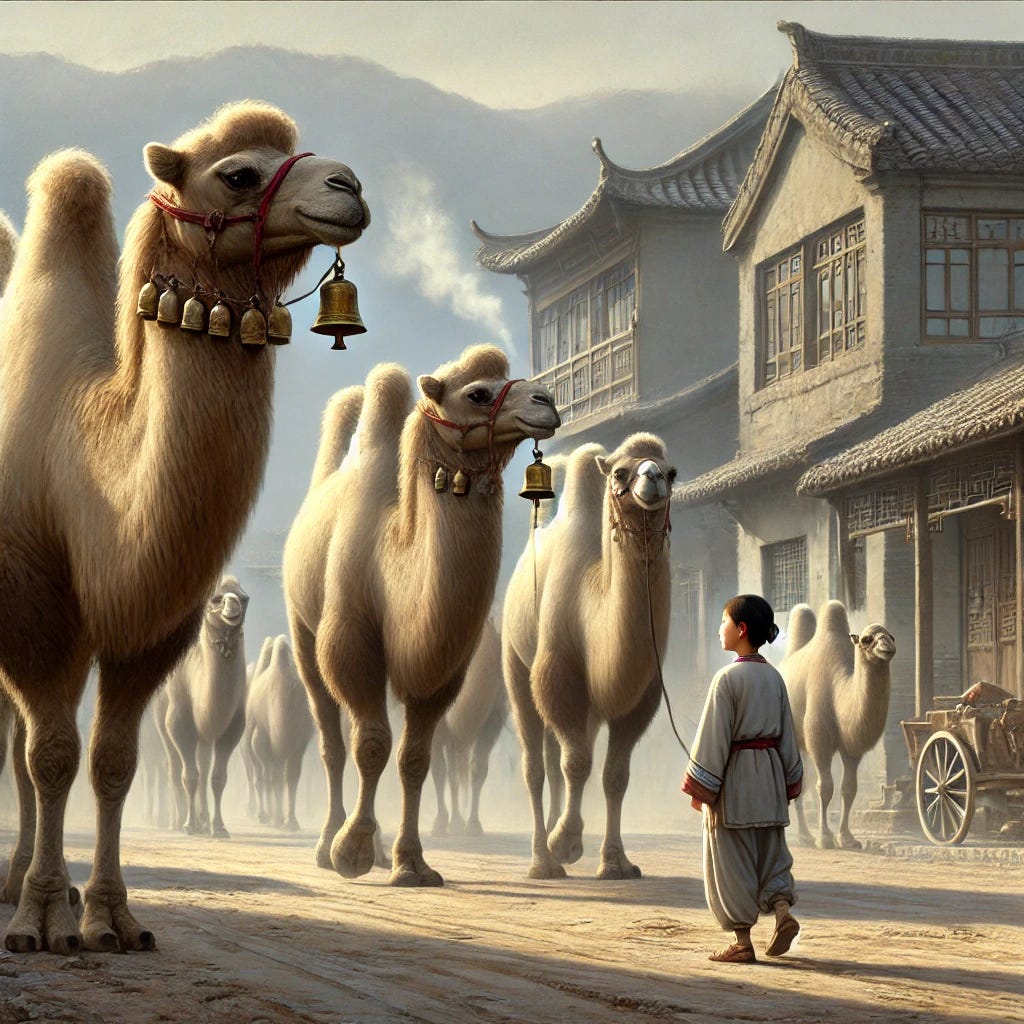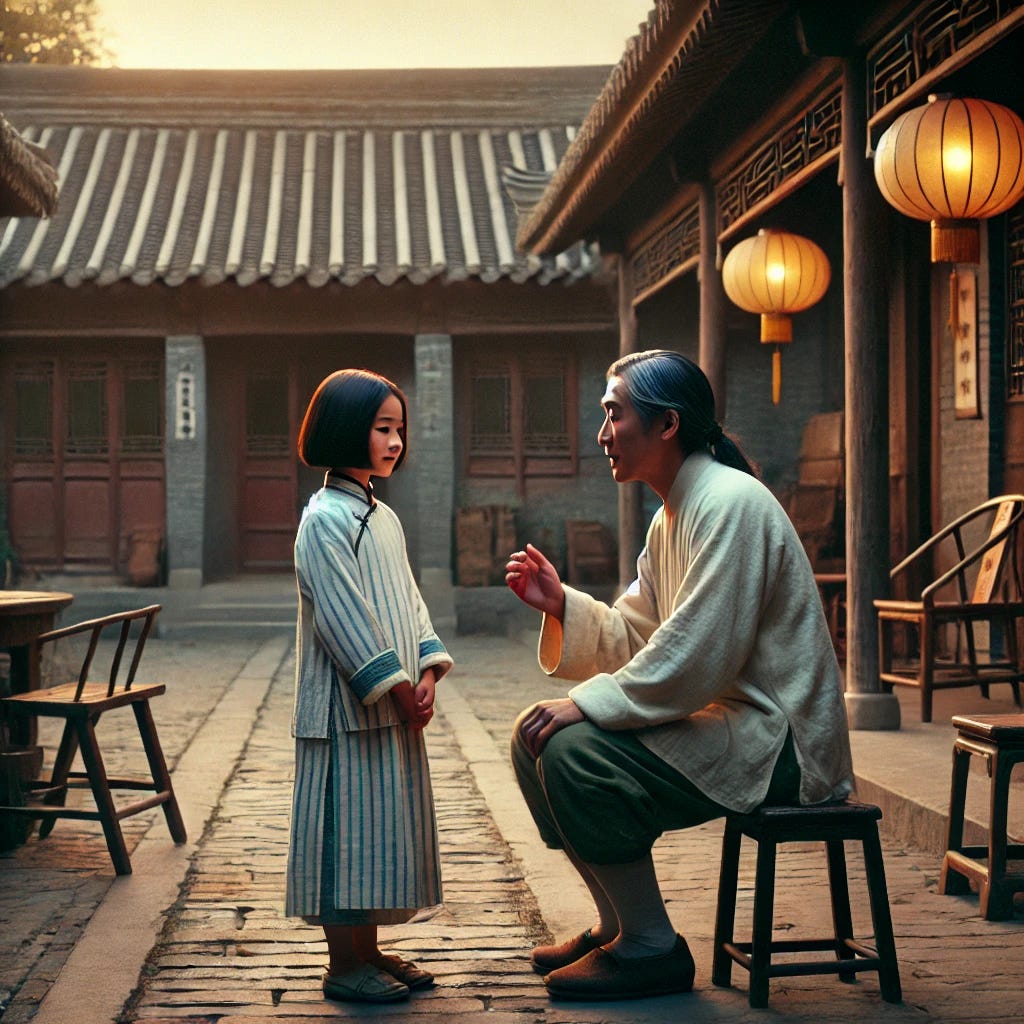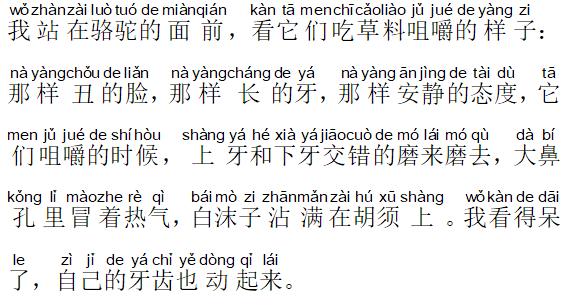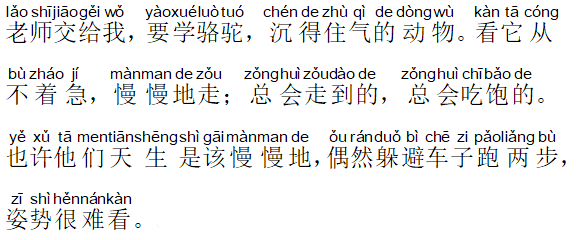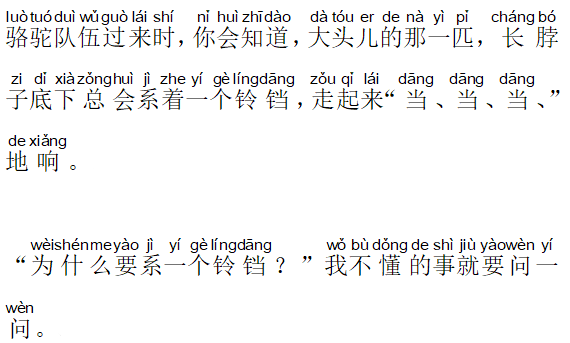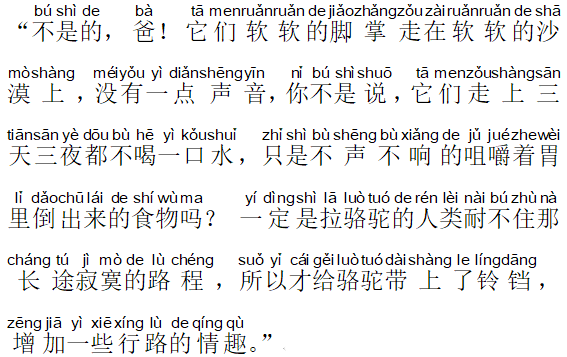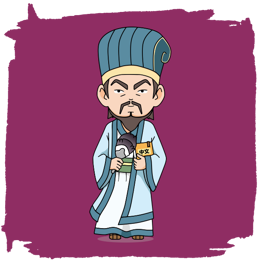《城南旧事》“骆驼的故事” 林海音著 - Advanced
An excerpt from "Old Stories from South Beijing" by Lin Haiyin
《城南旧事》: A Glimpse into Life in 1920s Beijing
Written by 林海音 (Lín Hǎiyīn), 《城南旧事》(chéng nán jiù shì), "Old Stories from South Beijing," is a nostalgic and touching novel set in 1920s Beijing. The book offers a semi-autobiographical reflection of the author’s childhood, capturing the life and atmosphere of old Beijing, particularly in the southern part of the city. During this period, China was undergoing significant political and social upheaval. The fall of the Qing Dynasty, the rise of the Republic, and the presence of warlords left a lasting impact on everyday life. Yet, within the walls of this ancient city, traditions and family life carried on, often quietly insulated from the larger turmoil.
I have been reading this novel with one of my long-time students, exploring the rich colloquial language and the colorful descriptions of culture, life, and personal interactions woven throughout the stories. The book offers an intimate look at daily life through the eyes of 英子 (Yingzi), a young girl whose innocence and curiosity bring the narrative to life.
One of the memorable vignettes is the camel story ("骆驼的故事"). In this excerpt, Yingzi marvels at a group of camels passing through the village. She observes their slow, deliberate movements and quiet demeanor, contrasting their patience with human nature. This passage, like many others in the novel, beautifully captures the essence of Beijing life at the time, reflecting a world that was both simple and profound.
Through scenes like this, 《城南旧事》 captures the slower, more contemplative pace of life in old Beijing. The novel beautifully reflects the charm of a bygone era, as well as the emotional depth of childhood, familial bonds, and the subtle transitions of life. For modern readers, it serves as a window into the cultural and social dynamics of 1920s China, while exploring universal themes of innocence, change, and the passage of time.
《城南旧事》“骆驼的故事” 林海音著
(第二至五页)
我站在骆驼的面前,看它们吃草料咀嚼的样子:那样丑的脸,那样长的牙,那样安静的态度,它们咀嚼的时候,上牙和下牙交错的磨来磨去,大鼻孔里冒着热气,白沫子沾满在胡须上。我看得呆了,自己的牙齿也动起来。
老师交给我,要学骆驼,沉得住气的动物。看它从不着急,慢慢地走;总会走到的,总会吃饱的。也许他们天生是该慢慢的,偶然躲避车子跑两步,姿势很难看。
骆驼队伍过来时,你会知道,大头儿的那一匹,长脖子底下总会系着一个铃铛,走起来“当、当、当、”地响。
“为什么要系一个铃铛?”我不懂的事就要问一问。
爸爸告诉我,骆驼很怕狼,以为狼会咬它们,所以人类给它们带上了铃铛,狼听见铃铛的声音,知道那是有人类在保护,就不敢侵犯。
我的幼稚心灵中却充满了和大人不同的想法,我对爸爸说:
“不是的, 爸! 它们软软的脚掌走在软软的沙漠上,没有一点声音,你不是说,它们走上三天三夜都不喝一口水,只是不声不响的咀嚼着胃里倒出来的食物吗? 一定是拉骆驼的人类耐不住那长途寂寞的路程,所以才给骆驼带上了铃铛,增加一些行路的情趣。”
爸爸想了想,笑笑说:
“也许,你的想法更美些。”
请注意:如果你是母语者,请通过Substack留言指出错别字或语法问题,以便保持帖子质量。
感谢合作!
Download the PDF file HERE.
These PDFs are designed to help you immerse yourself fully in the language, focusing on reading and comprehension without Pinyin or vocabulary lists. You can download, print them out, and use them for study and review at your own pace.
Reading breakdown by paragraph with vocabulary and audio.
城南 (chéng nán) – South of the city (北京)
旧事 (jiù shì) – past events, old stories
骆驼 (luò tuó) – camel
著 (zhù) – written by
草料 (cǎo liào) – fodder, hay
咀嚼 (jǔ jué) – to chew
交错 (jiāo cuò) – to interlace, to crisscross
磨 (mó) – to grind
鼻孔 (bí kǒng) – nostril
热气 (rè qì) – steam, hot air
白沫子 (bái mò zi) – foam, froth
沾满 (zhān mǎn) – to be covered with
胡须 (hú xū) – beard, whiskers
呆 (dāi) – stunned, dazed
交给 (jiāo gěi) – to assign (a lesson), to entrust
沉得住气 (chén de zhù qì) – to stay calm, to remain patient
着急 (zháo jí) – to worry, to be anxious
天生 (tiān shēng) – innate, natural
躲避 (duǒ bì) – to avoid, to dodge
姿势 (zī shì) – posture, pose
队伍 (duì wǔ) – team, procession, group
大头儿 (dà tóu er) – the leader, the one at the front
系 (jì) – to tie, to fasten
铃铛 (líng dāng) – bell
响 (xiǎng) – to ring, to make a sound
Interested in diving deeper into this or any other Mapping Mandarin™ post? I offer personalized lessons to help you explore the content further, focusing on both linguistic details and cultural insights.
I also provide one-on-one tutoring to enhance your Mandarin skills, improve pronunciation, reading comprehension, and clarify challenging grammar. Contact me to elevate your Mandarin learning!
怕 (pà) – to fear, to be afraid of
咬 (yǎo) – to bite
人类 (rén lèi) – humankind, humans
带上 (dài shàng) – to put on, to attach
侵犯 (qīn fàn) – to invade, to intrude
幼稚 (yòu zhì) – childish, immature
心灵 (xīn líng) – mind, soul
软软的 (ruǎn ruǎn de) – soft
脚掌 (jiǎo zhǎng) – sole of the foot, paw
沙漠 (shā mò) – desert
长途 (cháng tú) – long-distance
寂寞 (jì mò) – loneliness
路程 (lù chéng) – journey, distance traveled
行路 (xíng lù) – to travel, to walk on a journey
情趣 (qíng qù) – interest, fun, pleasure
想了想 (xiǎng le xiǎng) – thought for a moment
想法 (xiǎng fǎ) – idea, thought
美些 (měi xiē) – more beautiful, better
Character Radical
The 马 (mǎ) “horse” radical often appears in characters related to animals, movement, and travel, fitting the context of the story, which focuses on the journey and the camels.
Examples from the reading:
骆驼 (luò tuó) – camel
Other Common Examples of the 马 radical:
骑 (qí) – to ride by straddling (i.e., to ride a horse, bike, motorcycle, etc.)
骏 (jùn) – a fine horse, strong steed
驰 (chí) – to gallop, to speed
骂 (mà) – to scold (this also has the 马 radical despite being unrelated to animals)
Yin-yang Character Groups
Yin-yang character groups illustrate the balance and complementary nature of concepts in the Chinese language. Here are three pairs that align with the reading:
软 (ruǎn) – 硬 (yìng): Soft and Hard
动 (dòng) – 静 (jìng): Movement and Stillness
远 (yuǎn) – 近 (jìn): Far and Near
Thank you for reading Mapping Mandarin™! I’m passionate about making these posts accessible to everyone. If you’re able, please consider supporting with a donation to help keep them available for all. Whether it’s a yearly pledge or an occasional contribution, your support makes a difference. 感谢!
Also, check out my other Substack: Heart Of China Journal!
And the Master Mandarin YouTube channel!



